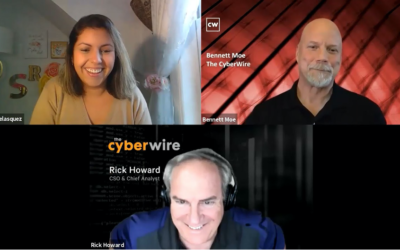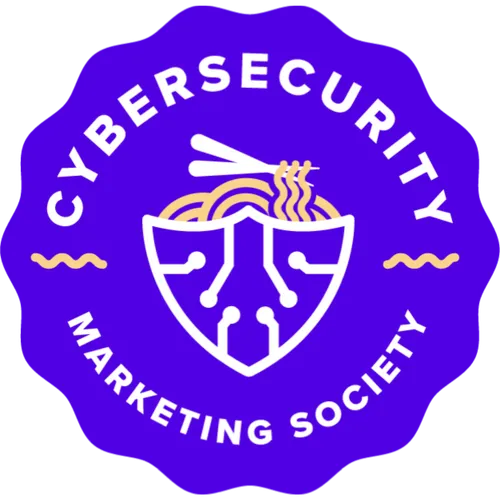Recap of Cyberwire Fireside Chat


The Cybersecurity Marketing Society recently held a Fireside Chat about creating content that cybersecurity audiences love, featuring panelists from The Cyberwire, the #1 cybersecurity podcast network. We were so pleased to have Rick Howard, CSO and Chief Analyst, and Bennet Moe,Head of Business Development and Ad Operations, come speak to us about what makes the Cyberwire so popular with cybersec readers.
We’ve recapped some of the talk in this post, but you’ll want to get the full experience by watching the recap here!
What are the most trusted sources of news for security professionals?
Since cybersecurity is always changing, it is difficult to keep up with the current state of things. For Rick Howard, he consumes information from podcasts, long-form content, cybersecurity books, and other big news and media outlets, such as the NYT and Washington Post. Bennet Moe recommends getting information from “outside of your own bubble” of sources to become more well-rounded. It is important to find reliable sources that communicate information effectively and briefly–we’re all busy and so is the cybersecurity audience. Since the pandemic erased the daily commute yet added a ton of digital exposure, consumers have begun to prefer more short-form content.
When evaluating a new security tool, how do you vet vendors?
Howard says that he doesn’t go to a vendor first when identifying a problem. When vendors pitch their ideas, they would talk to customers to figure out how to solve their problem, then hand them over to a salesperson. It should be kept a high-level of thinking, so focusing on the problem and fixing it instead of a product and selling it. Bennet says that process is really about building trust in your audience, which you can do by having a consultative approach and creating content that makes people smarter. Howard recommends getting practitioners in your marketing/sales mix, because they have an “instant gravitas.”
Are there specific topic areas that you see get more traction from the industry (viewership/audience) or is it all over the board?
Moe says that the trends ebb and flow, and right now election security is at the top of minds in addition to working at home. Howard chimes in by saying that every podcast and webinar has talked about working at home, so maybe it isn’t the best topic to put on the agenda. He also says that he doesn’t want to hear about the latest ransomware, but what does interest him is anything new that is different from anything done before.
It can be hard to stand out in the cybersecurity industry because every vendor believes they’re bringing something new to the market, which may or may not be the case. Products now aren’t wanted just because they’re shiny and new, instead people want products that do what they want and integrate with all of their other products.
What else do you look for in stories for The Cyberwire?
In their daily podcast, the Cyberwire includes stories they think are the top things that leaders in the industry need to know that day. They interview two guests each show, a partner and a guest. The partners are leaders in the industry that commentate on things, and the guest is someone that has something interesting and substantive to say. They don’t normally report on breaking news, but instead they like to give well-reasoned approaches to the content that they’re doing. They also have other shows that are very topical, for example Caveat, which focuses on cyber law and policy.
What type of content do you most consume? Blogs? Podcasts?
Howard is a big consumer of podcasts and essays online. For webinars, he says he will join if he knows the person and respects them or he’s heard of the person and is interested in the subject. He says it is alllllll about the content.
Moe says he likes the quick-bite content such as podcasts. He also likes webinars that are subject-matter-specific and aligned with either problems he is experiencing or generally have information that he finds interesting within his role, his company’s focus, or a personal interest. The pandemic has changed those patterns for him.
How has the pandemic changed some of our behaviors in consuming media and producing content? What are some of your most notable changes and what do you think will actually stay permanent?
Moe says the biggest impact was in live and in-person events, which have stopped entirely and are very slow to come back. On the AdOps side of things, vendors are re-allocating their funds. Webinars now include a lot of the same things that they would have done at live in-person events. They aren’t a one-to-one replacement, but he thinks that virtual events are here to stay, especially because they’re open to people who wouldn’t have a chance to come in person.
Howard emphasizes the fact there are so many webinars being held, and that it is hard to pick and choose which ones to attend. He says that the one big thing security professionals aren’t getting from virtual meetings that they would get from conferences is the social bit. On the other hand, virtual meetings do come with some personal aspects and engaging conversations that may not have been present at in-person events.
Do you still believe in email (from vendors)?
Howard says he doesn’t answer emails from vendors unless he reached out first, so they’re dead to him. He says you need a more creative way in.
What are three things you wish vendors would stop doing?
- Cold calls
- Unsolicited emails
- LinkedIn “Hey we should connect because we have people in common”
- Instead say “Hey I saw something you said and I have a question about it”
Watch the whole chat!
There’s nothing like hearing the laughs and the back and forth between our panelists and host –
Get to Know the Panelists
Bennet Moe has been the Director of Business Development and a Contributing Editor at The Cyberwire since 2018. He has rich experience in having leadership positions at various companies such as Headwall Media LLC, International Map Industry Association (IMIA), Automotive Navigation Data (AND), and Maps.com. He graduated from the University of Maryland Baltimore County with a BA in Visual and Performing Arts- Graphic Design.
Rick Howard is the Chief Analyst, CSO, and Senior Fellow at The Cyberwire. His prior jobs include Palo Alto Networks CSO, TASC CISO, iDefense GM, Counterpane Global SOC Director, and the Commander of the U.S. Army’s Computer Emergency Response Team. He has a Masters of Computer Science from the Naval Postgraduate School and an engineering degree from the US Military Academy.
Recent Posts
- Last Minute Affordable Sponsorship Options for RSA Conference 2024: Grab ‘Em Before They’re Gone!
- Unlocking Product Marketing Strategies with Andy Tzortzinis
- RSAC 2024’s Coolest Parties!
- Empowering Diversity in Cybersecurity: Spotlight on Nonprofits Making a Difference
- Breaking Through in Cybersecurity Marketing: How to Have a Successful Funny Cybersecurity Campaign with Deidre Frith

.png)
.png)
.png)